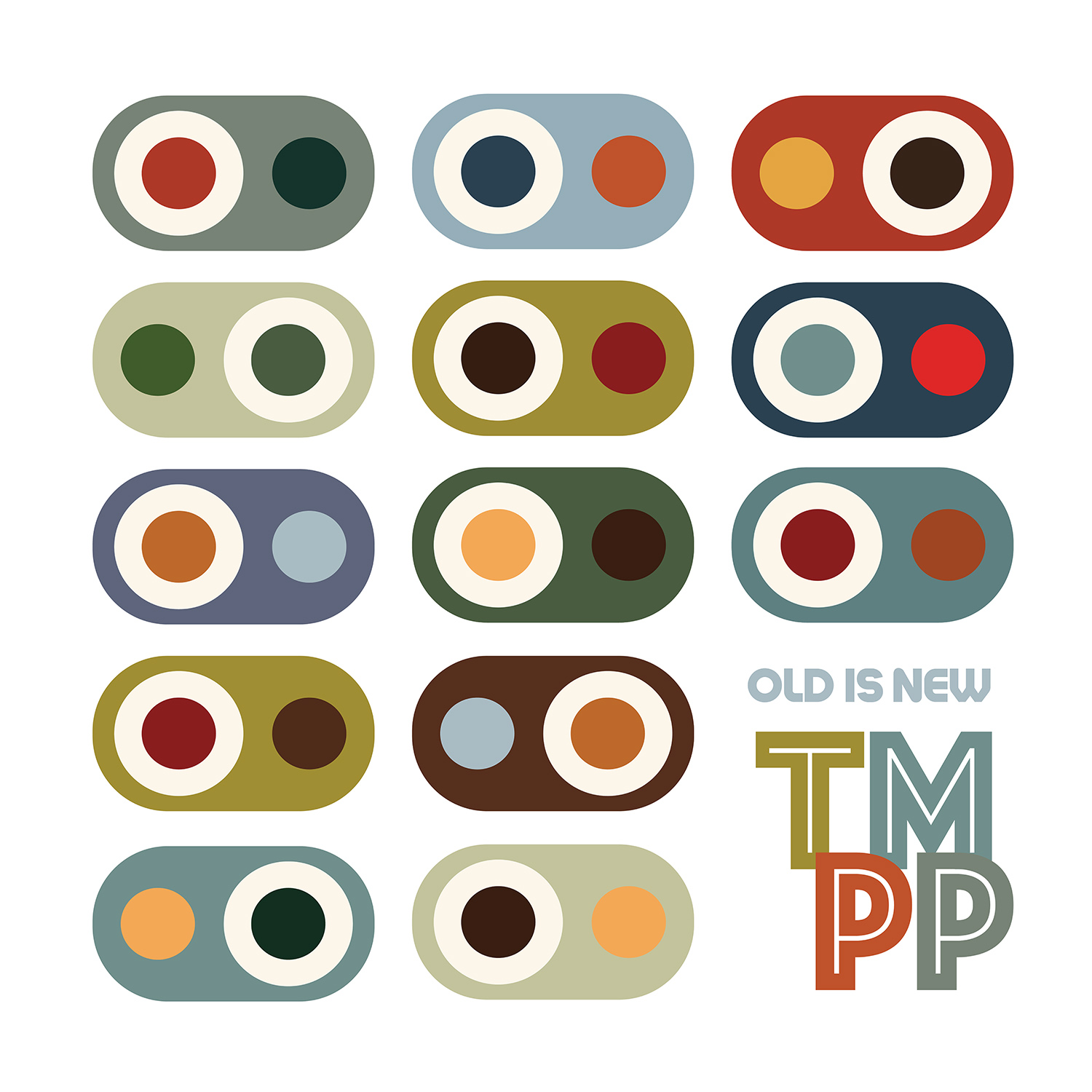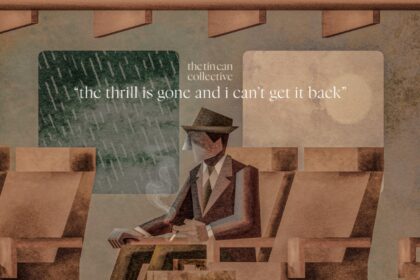The Muster Point Project’s album “Old is New” feels like a quiet reckoning — a reflection on time, love, and the spaces we drift through in between. Across thirteen tracks, the band meditates on the small and large ways we change, lose, remember, and start again. It’s not an album built for instant gratification or flashy hooks, but meant to be lived with. The songs unfold like conversations with old friends — tender, introspective, and a little worn around the edges. Musically, “Old is New” balances folk-infused Americana with shades of indie rock and alt-country, its tone grounded by Kevin Franco’s honest songwriting and understated delivery. It’s a record that knows exactly what it wants to say — and more importantly, how it wants to make you feel.
From the very beginning, with “Stuck in Transit”, the mood is set: wistful yet alive, rooted in melody but open to exploration. The track captures that in-between state — physically, emotionally, spiritually — of being neither where you were nor where you’re going. The acoustic guitars sway with a kind of patient rhythm, while the vocals feel conversational, as if Franco is letting you in on a story mid-sentence. There’s a rawness in how the lyrics acknowledge uncertainty, but also a quiet optimism: the idea that movement, no matter how slow, still means progress. It’s the kind of song that feels like a soft exhale, perfectly framing the album’s central question — how do we carry the past forward without being trapped by it?
“You Lose and You Gain” follows with a sense of knowing acceptance. Built around a bright yet unhurried tempo, the song feels like the musical equivalent of sunlight breaking through a cloudy morning. Franco’s lyricism shines here as he doesn’t sugarcoat the realities of growing older or the way relationships shift with time, but there’s compassion in his tone. The refrain — simple, cyclical, inevitable — reminds us that loss and growth are two sides of the same story. It’s Americana at its most grounded: reflective without being overly sentimental, personal yet relatable to anyone who’s had to let something go.
Then there’s “Believe in Yourself”, a track that straddles the line between encouragement and realism. Where a lesser songwriter might have leaned into cliché, Franco writes with humility and restraint. His message of self-trust feels earned, not performed. The arrangement mirrors that sentiment — sparse but warm, with subtle touches of piano and brushed percussion that lend the track an almost campfire intimacy. This song in particular highlights “Old is New’s” ability to comfort without pandering. The Muster Point Project doesn’t preach, but observes. They sing about the doubts, the hesitations, and the quiet bravery that define real life.
Midway through the record, “You Are My Breeze (Radio Edit)” and “U-R 2 GUD” introduce a touch of lightness. The former flows with a soft, airy rhythm — part folk lullaby, part summer drive soundtrack — while the latter brings in a playfulness that feels refreshingly unguarded. These songs remind us that not every reflection needs to be heavy. In “U-R 2 GUD,” Franco’s phrasing dances across a melodic backdrop of jangly guitars and steady percussion, evoking a sense of affection that’s tongue-in-cheek and deeply sincere. They’re the kind of moments that give the album its balance — gentle reminders that nostalgia doesn’t always have to ache.
The emotional centrepiece of “Old is New” comes with “Old Black Suit,” a song that encapsulates the record’s theme of time and memory. Using the metaphor of a worn suit — something kept, altered, and outgrown — Franco explores friendship, loss, and the quiet dignity of ageing. The track unfolds slowly, with acoustic and string arrangements intertwining like threads of memory. There’s something cinematic about its restraint; every note feels carefully placed, every word deliberate. It’s one of those rare songs that says more in what it withholds than what it reveals. You don’t just hear “Old Black Suit” — you feel it, like an echo of your own past rising to the surface.
Later, tracks like “Forgotify” and “Tell It To The Night” bring a subtle experimental flair. “Forgotify” plays with texture and structure, layering melodic fragments and ambient tones in a way that evokes nostalgia and reinvention — the very essence of the album’s title. “Tell It To The Night,” on the other hand, feels like an open letter to solitude. It’s moody yet strangely comforting, the kind of late-night track that invites quiet reflection. These songs show TMPP’s willingness to step outside genre boundaries, proving that their brand of folk-Americana isn’t stuck in tradition but alive with curiosity.
The closing stretch deepens the emotional tone. “I Can Only Cry” reimagines the country ballad with striking vulnerability — less about heartbreak in the conventional sense and more about the weight of simply feeling too much. Franco’s voice cracks just slightly in places, and it’s those imperfections that make the song so real. Then comes “Alone Again,” one of the album’s unreleased gems, built around the theme of betrayal. It’s sparse, haunting, and quietly devastating, closing the album with an air of reflection rather than resolution. Both tracks underline TMPP’s greatest strength: their ability to find poetry in pain without overdramatising it.
The musicianship throughout Old is New is impeccable yet unobtrusive. Mixed and produced by Darryll McFadyen (Belle & Sebastian, Simple Minds), the album carries a natural warmth and clarity that lets every instrument breathe. Studio collaborators Marcelo Effori, Oleg Pisarenko, Per Löfdahl, Sterling Laws, and author Geoff Moore add subtle flourishes that enrich the sonic palette without overwhelming it. The arrangements feel lived-in — as if the songs were recorded in the glow of afternoon light rather than under studio spotlights. Even the bonus vinyl tracks, exclusive to physical editions, feel like artefacts meant to reward listeners who want to sit down, slow down, and truly listen.

In Old is New, The Muster Point Project revisits familiar themes and redefines them. It’s an album about cycles: the way people, emotions, and even music evolve while holding traces of what came before. Each song feels like a page from the same diary, but written on different days, in different moods. TMPP’s mission to “keep indie rock’s home fires burning” is a promise they’ve fulfilled through thoughtful songwriting, patient musicianship, and emotional honesty. “Old is New” reminds us that the passage of time doesn’t erase what we’ve lived, but reframes it, allowing old truths to shine through new light.
In the end, “Old is New” is an emotional companion. It doesn’t chase trends or hide behind irony. Instead, it offers listeners something rarer: sincerity. The kind that grows deeper with each listen, the kind that lingers like an aftertaste of bittersweet memory. The Muster Point Project has crafted a record that feels timeless — rooted in the past, present in the now, and quietly hopeful for what’s next. In a world that often demands the loudest voice, “Old is New” speaks softly — and somehow, that makes it resonate even more.
For more information, follow The Muster Point Project:
Website – Facebook – Spotify – Soundcloud – Bandcamp







